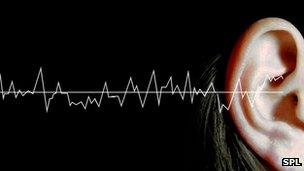Hearing-aid hackers fine-tuning their own devices
- Published

If you are short-sighted, usually all it takes is a visit to an optician to get a pair of spectacles to help restore the world to sharp detail.
But if you suffer hearing problems, visiting an audiologist just the once will probably not restore sounds to crisp clarity.
The consequent frustration is driving some people with the appropriate expertise to hack into their own hearing aids to carry out DIY improvements.
Brian Moore, professor of audiology at the University of Cambridge, explained: "It's not the same as spectacles where you know you have the right prescription.
"With a hearing aid you can have an initial prescription but you will need to do some fine-tuning around that afterwards to satisfy the individual person."
He said the tuning process was frustrating because of the difficulty in making hearing aids work within different levels of noise.
Catering for young
Now some tech-savvy users are taking the initiative.
"Hearing aids are becoming a more and more interesting target not only to hack, but also simply to connect them to all kinds of consumer hardware and make the experience more seamless," said Helga Velroyen, a Munich-based software engineer who has been at the forefront of efforts to modify hearing aids.
Her interest in the topic was sparked when her own hearing started to degrade a few years ago.
In Germany, she said, the average age of a person buying their first hearing aid was 70, meaning that most equipment had been kept simple to cater for this ageing audience, she added.
This desire for simplicity meant that manufacturers were often reluctant to introduce features common in other consumer electronics.
"Young people who grew up with computers and have a smartphone have the desire to have more control over their devices and would not mind a more sophisticated interface," Ms Velroyen told the BBC.
In addition, she said, the design of each hearing aid was different and its parts and accessories were not interchangeable with other brands.
"I would like to have the freedom to choose hearing aids and peripheral hardware independently according to what I consider the best quality," she said. "I don't want to be caged in a hell of proprietary dependencies."
Frustrated hackers have made their own connectors that link their hearing aids to Bluetooth headsets.
Others have set up fake companies to get hold of the equipment audiologists use to tune the devices. Some have established a self-tuning movement that aims to let people customise their hearing aids to match their particular impairments.
DIY design
For some, this tinkering does not go far enough. Edinburgh-based engineer Martin Ling has set up a project to produce one in which all the parts and the code it runs would be accessible to anyone to work on and improve.
"My partner is quite deaf and has been using hearing aids for about 20 years," he said. "That's where my interest comes from."
Mr Ling's early attempts to hack a hearing aid involved dismantling one of his partner's old ones and wiring it up to a laptop to watch how it handled sound. Now he is working on a design built from scratch.
"We could make a small number of these so we could get hardware in the hands of people that wanted to test it," he said. "Then as the signal-processing ideas get pinned down we can start to work on miniaturising it."
Mr Ling said he was considering starting a crowd-funded project on Kickstarter or a similar site to build the first prototypes.
"A lot of this comes down to signal processing and software engineering problems," he said.
Ideally, he said, the result would be a hearing aid that a person would be able to adjust to deal with their particular hearing problem.
"This idea that you are not qualified to tune your own hearing aid that you are wearing for hours and hours every day seems ridiculous," he said.
Dr Kevin Munro, professor of audiology at the University of Manchester, was sceptical about Mr Ling's chances of producing a DIY device.
"They are not the sorts of things you can throw together in a garden shed," he said, adding that hearing-aid makers invested hugely in research and development to produce the gadgets on sale now.
Despite the scepticism, Ms Velroyen has a vision for what a future hearing aid would be like: it would have a long battery life, work even if its owner went swimming or to the gym and would link seamlessly with a mobile phone to adjust its sensitivity depending on where its owner was and who they were talking to.
"Development is way too slow," she said. "I would like to see much more progress on that."
- Published20 June 2012
- Published10 April 2012
- Published20 March 2012
- Published5 March 2012
- Published20 September 2011